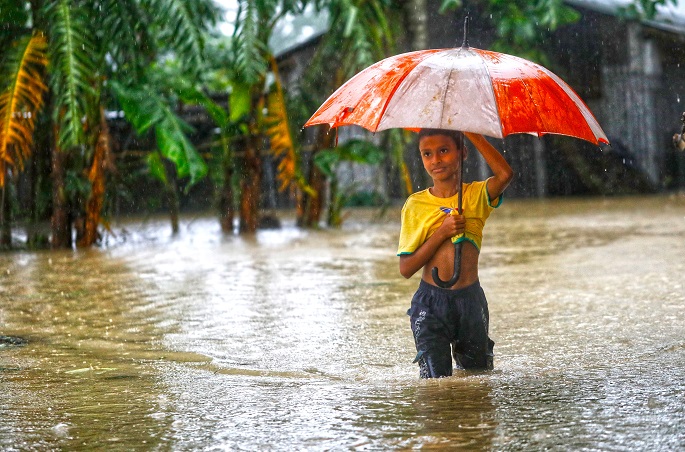Severe flooding in northeastern Bangladesh after weeks of heavy rains has caused widespread destruction and stranded people, CNN reported.
The Water Development Board said the widespread flooding was triggered by prolonged heavy rains and runoff from hilly areas upstream on the border with India, causing four rivers to overflow.
State media and aid agencies have reported that about 1.8 million people have stranded in northeastern Bangladesh after weeks of heavy rains inundated homes and devastated farmland. The local media expressed fears about those trapped by the floodwaters, who now face shortages of food and clean water.
Nearly 964,000 people in Sylhet and 792,000 in Sunamganj have already fallen victim to the floods, and authorities said they have set up more than 6,000 shelters to help the displaced. Among them are 772,000 children, the United Nations’ Children’s Fund (UNICEF) said on Friday. More than 800 schools went under water, with another 500 utilised as flood shelter, according to UNICEF. Sheldon Yett, UNICEF Representative to Bangladesh, said in a statement:
As waters rise, children are the most vulnerable, facing heightened risks of drowning, malnutrition, deadly waterborne diseases, the trauma of displacement, and potential abuse in overpopulated shelters.
International development organisation BRAC said it was helping to deliver emergency food and medical aid to hundreds of families in Sylhet and Sunamganj. Meanwhile, 2.25 million people suffered floods and 12,000 remained without electricity.
The densely populated and low-lying Bangladesh is prone to seasonal rains, floods and cyclones. Studies suggest the South Asian country is one of the most vulnerable in the world to the effects of the man-made climate crisis due to the increasing frequency of extreme weather conditions.
By 2050, according to the World Bank, 13 million people in Bangladesh may become climate migrants, and severe flooding may cause GDP to fall by as much as 9 per cent. Sultana Begum, Save the Children’s regional humanitarian advocacy and policy manager for Asia, said in a statement:
Everything we are hearing points towards these kinds of extreme weather events getting worse and worse. And we have certainly not seen two bouts of severe flooding happen in such quick succession before. Make no mistake, the climate emergency is already making its mark on India and Bangladesh, and it is robbing children of their homes, families, food, water, and access to education and healthcare.
Save the Children reported the monsoon season in Bangladesh has just begun and will extend for the next two months, which may bring more torrential rains, landslides and floods. In spite of this, local media reported the rains have begun to subside and there are signs of floodwaters beginning to recede. On Sunday, the Bangladesh Water Development Board confirmed water levels in major rivers in the northeast are falling, a trend that might continue in the coming days if further rains stop.
